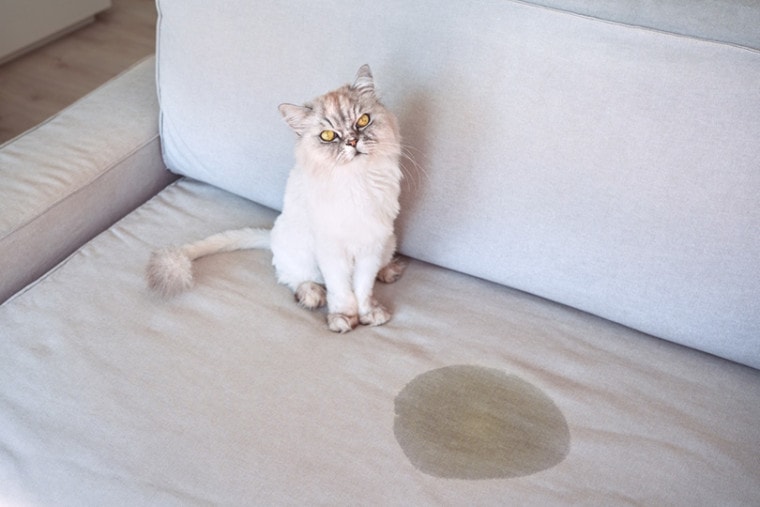
Click to Skip Ahead
If your cat starts to urinate outside of the litter box and onto your furniture, it can leave the furniture full of stains and smell bad. This smell can be difficult to mask, and most household products will not be able to get rid of the deep stains in your furniture.
Whether your cats urinate on your couch, carpet, or bed, it’s important to neutralize the odor as the first step. Cats will often return to a spot to urinate again if it still smells of their urine.
It’s also important to figure out the cause of your cat’s urinating behavior so that you can find the underlying cause and prevent your cat from urinating on your furniture again.
This article will give you all the answers you need as to why your cat is urinating on your furniture and how you can get rid of the stains and lingering smells.
Products to Clean Up Cat Urine
Several products can help neutralize the odor of cat urine, such as vinegar, baking soda, and enzymatic cleaners. You should avoid using cleaning products that contain ammonia as an ingredient because they will not work as effectively.
Baking Soda & Vinegar
While vinegar itself may be smelly, it works well to remove the lasting odor of sprayed cat urine. This is because vinegar is an acid that neutralizes the alkaline salts that form in dried urine stains.
A solution of one part vinegar and one part water can be used to clean the furniture, walls, flooring, and wood without bleaching fabrics. The vinegary smell will subside after a few hours, taking the urine smell with it.
Enzyme-Based Cleaners
This type of cleaner can be used to eliminate odors from carpets, couches, cushions, mattresses, and linen. The enzymes in these products break down the acid in cat urine, helping to get rid of the smell at the same time. The natural enzymes and good bacteria help to get rid of the harmful bacteria that are causing unpleasant urine odors.
If you're trying to find an enzyme cleaner that does it all, we highly recommend our favorite cleaner, the Hepper Advanced Bio-Enzyme Pet Stain & Odor Eliminator Spray.
- ADVANCED ENZYMATIC CLEANER - Penetrates the most stubborn smells and stains at the deepest molecular...
- FOR ANY MESS, ON ANY SURFACE - This pet odor eliminator cleans your carpets, floors, furniture,...
- FRESH, NATURAL ODOR - Our unique formulation doesn't rely on dangerous or unpleasant chemical...
It permanently removes the very worst stains and smells you can imagine and makes clean up a breeze. There's even a 100% satisfaction guarantee! Click here to order a bottle today.
At Pet Keen, we’ve admired Hepper for many years, and decided to take a controlling ownership interest so that we could benefit from the outstanding products of this cool cat company!
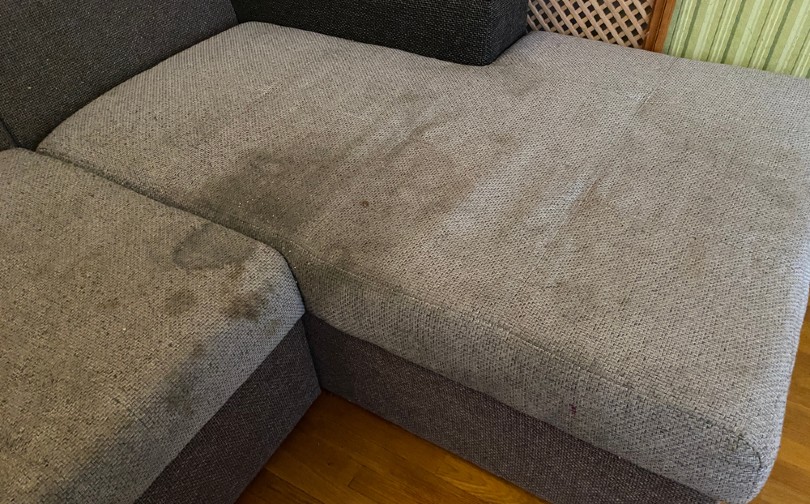
What to Avoid When Cleaning Cat Urine
Dr. Cathy Lund of City Kitty, a feline-only veterinary practice in Rhode Island, has insight on what not to do when it comes to cleaning urine smells and stains from your furniture.
Lund urges us to resist the temptation to go with cleaning products that contain ammonia. Using an ammonia-based cleaner may encourage your cat to remark the area because the smell of ammonia attracts them to urinate there again. Lund says that it is also important to avoid using steam or heat when cleaning items marked with cat urine because heat can “set the stain in.” This also applies to washes and dryers if you are washing furniture linen that your cat urinated on. It’s best to wash these items with your machine’s setting on cold water.
Lund also urges cat owners not to scold or discipline cats who have negatively urinated on their furniture. Instead of scolding your cat, clean up the area thoroughly and get to work on making your cat’s litter box as appealing as possible. Several clean, easy-to-access litter boxes will entice your cat to urinate in them instead. Place the litter boxes over problem areas and gradually move the litter boxes to where you want them to be once your cat begins to use them properly.
How Do You Get Rid of Cat Urine Smells & Stain From Furniture
As soon as you notice that your cat has peed on your furniture, it is essential that you soak up the pee and not let it sit too long, or the smell and stain will get worse.
1. Blot the Area to Absorb the Urine
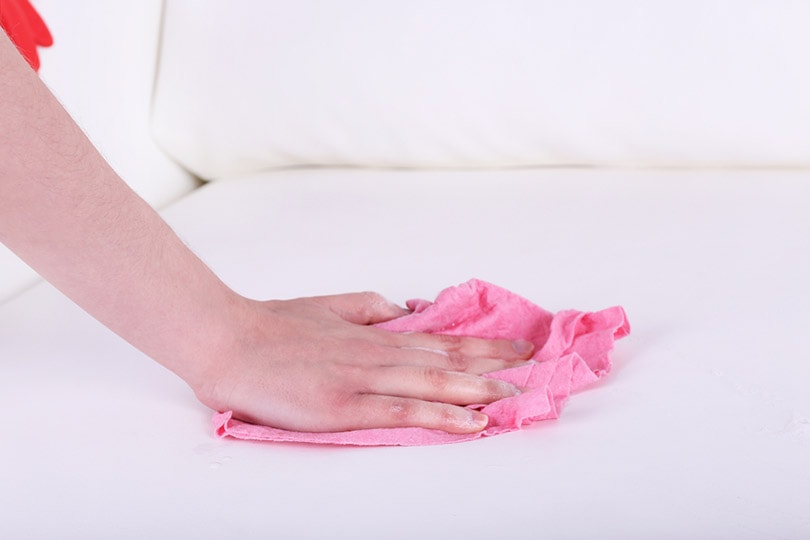
When you find the stain, blot up as much of the urine as you can by applying pressure to a cloth or paper towel over the urine stain. Press down hard to allow the paper towel or cloth to absorb the urine that has been set deep in the furniture to bring it to the surface.
2. Rinse & Vacuum the Area
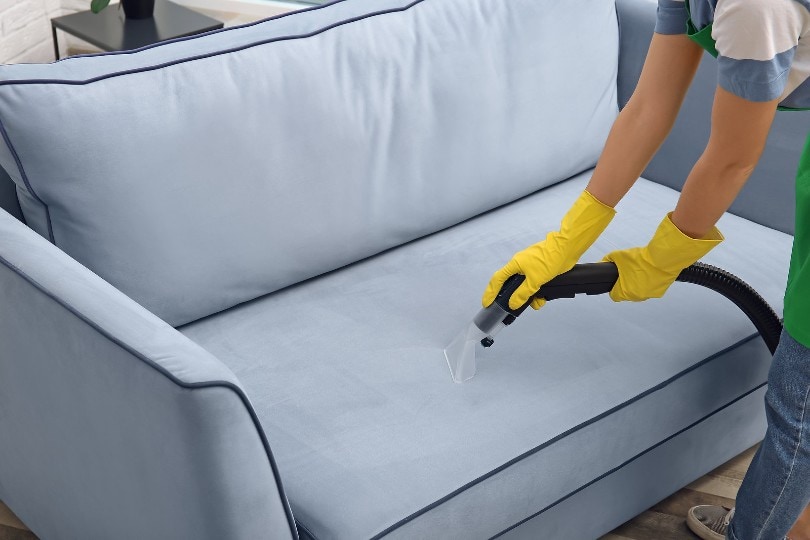
Next, rinse or soak the area with clean water and remove the liquid with a wet or dry vacuum—but avoid using a steam cleaner.
3. Soak the Spot in an Enzyme Cleaner

Most enzyme cleaners come in a spray bottle, but lightly spraying the affected area will not do much. Instead, remove the cap off the bottle and douse the area in the enzyme cleaner.
4. Let It Sit Before Blotting With a Clean Cloth
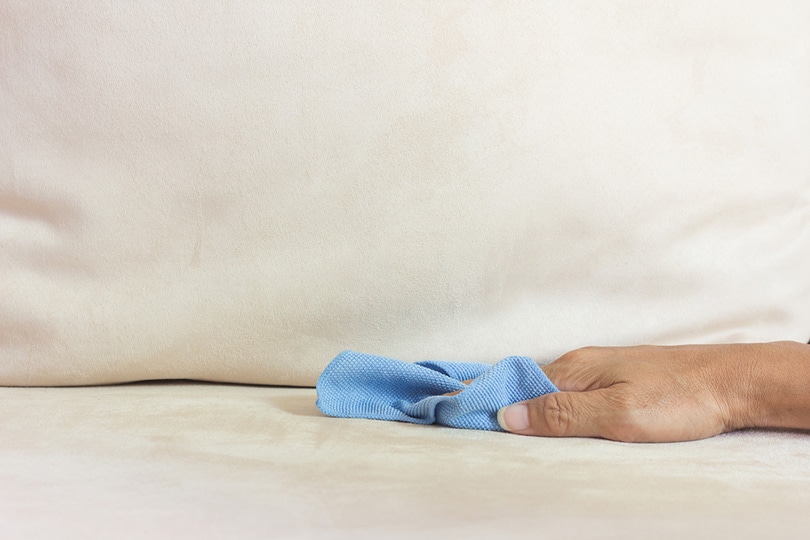
Let the cleaner sit for 10–20 minutes so that the ingredients can work properly. Then, blot the area again with a new set of paper towels or cloth to absorb the excess cleaner.
5. Reapply the Cleaner If Necessary

Once the area has dried and you find that there is still a lingering smell, you can reapply the cleaner or spray it over the area and let it sit overnight. Alternatively, you can try vinegar if the enzyme-based cleaner does not work.
6. Prevent Your Cat From Returning to the Area
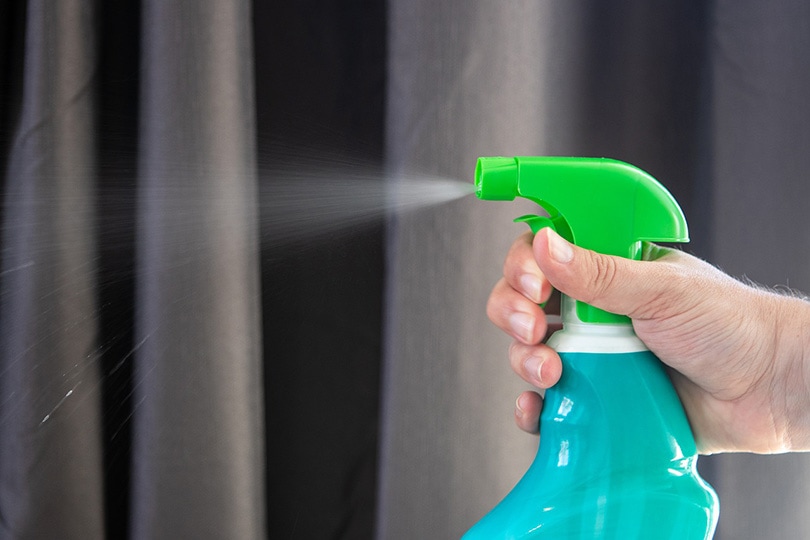
To keep your cat from urinating on that specific piece of furniture again, cover it with aluminum foil or place a solid object over it. You can also use a cat repellent spray to keep your cat off your furniture so that they do not urinate there again, such as the Four Paws keep off cat repellent spray.
Why Does Cat Urine Stain & Smell?
In comparison to other animals, cat urine seems to smell the worst. This is why there are so many different litter brands on the market to mask and deodorize cat urine because, without this litter, a cat’s litter box can smell bad quickly.
If your cat begins to pee on your furniture, the smell can become a nuisance. Not only does cat urine have a distinctive, almost fishy odor, but it can cause nasty yellow stains that are difficult to remove.
Cat Urine Gets Worse With Time
Once your cat has urinated on a piece of furniture and it goes unnoticed for a few hours, the bacterium in urine decomposes and gives off a slightly fishy and ammonia-like odor that’s a characteristic of old urine.
During the second stage of the urine’s decomposition stage, the urine emits mercaptans, which are the same compounds that give skunk spray a bad smell. With this in mind, it’s clear why cat urine smells so bad!
Older Cats Have Smellier Urine
Older cats have a different kidney function than younger cats as their kidneys have lost their efficiency as they’ve aged. This can cause senior cats to have worse-smelling urine, which can become a problem since older cats seem to display abnormal litter box behaviors due to problems such as arthritis or dementia, which can cause them to pee on the furniture, carpets, and flooring.

Hormones in Cat Urine
Male cats that are not neutered have powerful hormones that are eliminated when they pee. Unless a male cat is neutered, their testosterone-spiked urine signals other male cats to stay away and lets female cats know they are in the area. Female cats may also have a fishier odor in their urine when they are in heat, as they give off pheromones to attract male cats and let them know that she is in heat.
Cats Have Concentrated Urine
Cats have highly concentrated urine, which is what makes them stain surfaces, linen, and furniture so easily. Cats keep absorbing water from their urine, so when they do eventually pee, the strong odor and compounds in that urine are more concentrated, causing it to smell bad and stain easily.
Why Is Your Cat Urinating on Your Furniture?
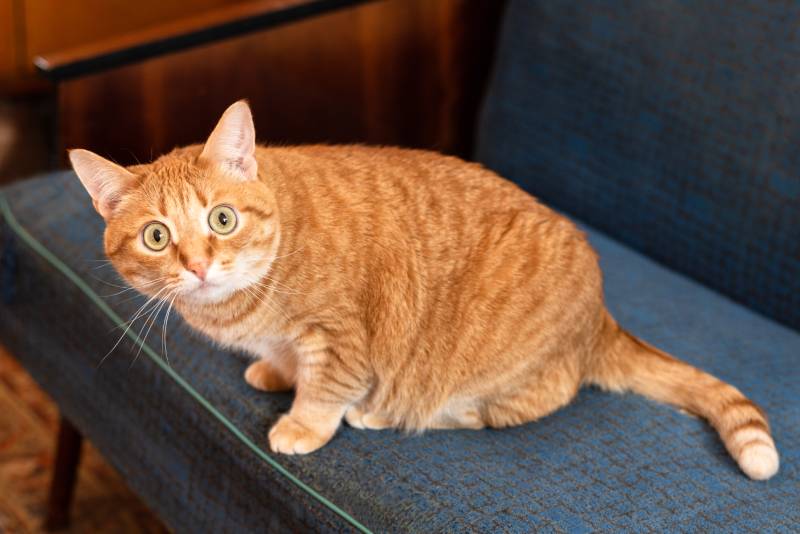
There are various reasons why a cat may start displaying abnormal litter box habits. Some owners may think that their cats do this as a way of looking for revenge or negative attention, but cats lack the cognitive abilities required to conduct that type of revenge strategy.
Dr. Laura George, DVM at Cats Exclusive Veterinary Centre in Washington, says, “Despite popular belief, cats do not urinate outside of the litter box to get back at their owner for something.” Rather, they may be displaying this behavior because they are not feeling well or something in their environment is bothering them.
Final Thoughts
The combination of ammonia and mercaptans present in cat urine gives it an unpleasant smell, which can cause furniture and linen to smell bad. By cleaning the urine the correct way, you are not only ridding the furniture of the urine stain and smell, but you are also preventing your cat from urinating on the furniture again.
We hope that this article has helped you find a successful method to rid your furniture of the horrid urine smell and stains left behind by your cat.
Featured Image Credit: Creative Cat Studio, Shutterstock









